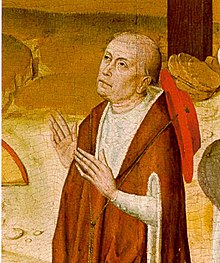
Back Nikolaus von Kues ALS نقولاس الكوزاني Arabic نكولاس الكوزانى ARZ Colás de Cusa AST Nikolay Kuzalı Azerbaijani نیکلاس کوسا AZB Мікалай Кузанскі Byelorussian Николай Кузански Bulgarian কুসের নিকোলাস Bengali/Bangla Nikola Kuzanski BS
Nicholas of Cusa | |
|---|---|
 Nicholas of Cusa, by Master of the Life of the Virgin | |
| Born | 1401 |
| Died | 11 August 1464 |
| Other names | Doctor Christianus, "Nikolaus Cryfftz", "Nicholas of Kues", "Nicolaus Cusanus" |
| Alma mater | Heidelberg University University of Padua |
| Era | Medieval philosophy Renaissance philosophy |
| Region | Western philosophy |
| School | Renaissance humanism[1] Christian humanism[1] |
Main interests | |
Notable ideas | Learned ignorance, coincidence of opposites |
| Bishop of Brixen | |
| Church | Catholic Church |
| In office | 1450–1464 |
| Other post(s) | Cardinal-Priest of San Pietro in Vincoli |
| Orders | |
| Ordination | 1436[2] |
| Consecration | 26 April 1450[2] by Pope Nicholas V |
| Created cardinal | 20 December 1448 by Pope Nicholas V |
Nicholas of Cusa (1401 – 11 August 1464), also referred to as Nicholas of Kues and Nicolaus Cusanus (/kjuːˈseɪnəs/), was a German Catholic cardinal and polymath active as a philosopher, theologian, jurist, mathematician and astronomer. One of the first German proponents of Renaissance humanism, he made spiritual and political contributions in European history. A notable example of this is his mystical or spiritual writings on "learned ignorance," as well as his participation in power struggles between Rome and the German states of the Holy Roman Empire.
As papal legate to Germany from 1446, he was appointed cardinal for his merits by Pope Nicholas V in 1448 and Prince–Bishop of Brixen two years later. In 1459, he became vicar general in the Papal States.
Nicholas has remained an influential figure. In 2001, the sixth centennial of his birth was celebrated on four continents and commemorated by publications on his life and work.[4]
- ^ a b c d e f Fiamma, Andrea (June 2017). "Nicholas of Cusa and the So-called Cologne School of the 13th and 14th Centuries". Archives d'Histoire littéraire et doctrinale du Moyen Âge, LXXXIV. 84 (1). Paris: Librairie philosophique J. Vrin: 91–128. doi:10.3917/ahdlm.084.0091. ISBN 978-2-7116-2815-5. ISSN 2109-9529.
- ^ a b Nikolaus Cardinal von Cusa
- ^ Sophia Howlett, Marsilio Ficino and His World, Springer, 2016, p. 42.
- ^ Izbicki, Thomas M. (Spring 2007). "Cusanus: The Legacy of Learned Ignorance". Renaissance Quarterly.
© MMXXIII Rich X Search. We shall prevail. All rights reserved. Rich X Search